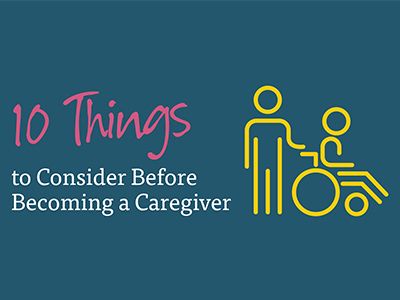It's an overwhelming journey. A labor of love. A huge responsibility. When caring for an aging or sick parent, spouse, child or another loved one, there are many big decisions you’ll have to make — from medical and financial issues to housing and legal concerns. Being prepared for what's to come can minimize expenses, reduce stress and help you maximize the quality time you have together.
First, keep in mind that caregiver responsibilities and duties vary by situation. There’s no right or wrong answer to the question, “What do caregivers do?”
As you consider caretaker roles and responsibilities, this checklist may help you and your loved one take the journey together – and make things a little easier for both of you.
Talk through medical issues.
- Maintain a current, complete list of all medications (including dosages) and doctors, along with notes on medical history.
- Gain a solid understanding of their health insurance and what's covered by Medicare, Medicaid and/or Social Security disability benefits.
- Research both short- and long-term care options so that you are prepared no matter what happens. There are many programs that include nursing, social work and occupational and physical therapy—both offsite and in-home.
- Ensure all medications are accessible and clearly marked for your loved one to access.
Make sense of your loved one's finances.
- Make a list of all bank account numbers, financial institutions, retirement accounts, mortgage information, car loans, credit card debt, etc.
- Assess all income and monthly expenses to make sure that necessary payments can be made.
- Know how bills are paid (online, recurring payment, by mail).
Understand the person's wishes and needs (for today and the future) by asking these questions:
- Do you wish to stay in your own home or will you need assistance?
- If you're not able to make medical or financial decisions for yourself, is there someone you trust to make them on your behalf?
- What kind of level of daily care, ongoing medical treatment or end-of-life care do you wish to receive?
- What fears, concerns or joys do you want to share with others as we go on this journey together?
- Have you considered how you would like funeral arrangements or financial obligations handled when the time comes?
Make sure the appropriate legal documents are in place once you understand your loved one’s needs. Documents include:
- Health care power of attorney: This is a document that designates someone to make medical decisions on behalf of the patient. This decision-making power is limited to when the patient is unable to make decisions on his or her own.
- HIPAA representative: The Health Insurance Portability and Accountability Act (HIPAA) is a federal law that helps protect the privacy of patients. Doctors, hospitals and insurance companies are required to follow HIPAA rules. This means they can only share medical information with the patient or the patient's personal representative, as dictated by this document.
- Living will: Also known as an advance directive, a living will details a patient's wishes regarding end-of-life care. This document goes into effect in terminal situations when a patient is in an end-of-life situation or permanently unconscious, and incapable of making his or her own decisions.
- Durable power of attorney: This document names someone to manage the patient's affairs beyond just medical care, allowing access to financial accounts and giving the person decision-making authority.
- Last will and testament: This outlines final directions for who will receive a person's assets, real estate and personal property when he or she dies. The will also identifies a person (executor) to carry out these orders and a person (guardian) to care for any children under the age of 18.
Discuss living arrangements. When choosing the best living arrangement for your loved one – whether it's remaining in their own home, moving in with you, downsizing, or choosing an assisted living or residential care facility —consider:
- Your loved one's personal comfort and preferences.
- Financial resources.
- Health concerns and needs.
- Availability of community and support services.
Know that the right living situation may change over time. If your loved one elects to remain in his/her own home, modifications such as adequate lighting, railings and ramps may have to be installed.



